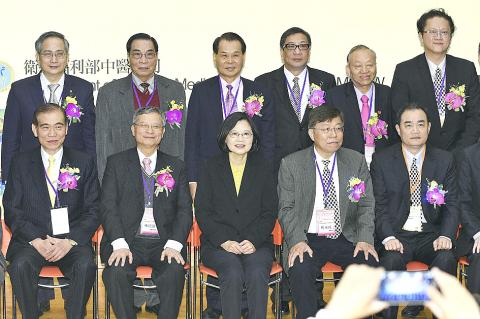President-elect Tsai Ing-wen (蔡英文) is to pursue a “new southward policy” to make a breakthrough in the nation’s diplomatic situation by pushing for international cooperation in humanitarian aid and disease prevention, branding Taiwan as a responsible key partner in the international community, according to a proposed foreign policy blueprint.
Tsai first presented her diplomatic policy platform at a reception with foreign ambassadors and representatives in Taiwan last year, at the time saying that maintaining peaceful international relations is a responsibility that all nations should share collectively.
Taiwan should maintain a strong and vivid international presence to keep the nation safe and promote diversity in trade, she added.

Photo: Chen Chih-chu, Taipei Times
Wu Chih-chung (吳志中), an associate professor of political science at Soochow University who headed a subgroup for foreign relations in a Democratic Progressive Party (DPP) think tank, on Saturday said that the foreign policy platform Tsai proposed during campaigning ahead of January’s elections — including maintaining peace and stability in the region, improving partnerships with diplomatic allies and reinforcing the nation’s international presence with the new southward policy — should be in line with expectations that the international society has of a DPP government.
To maintain “sustainable partnerships” with diplomatic allies, Tsai has said that the DPP government would actively interact with them through mutual cooperation between government, businesses and civic groups, aimed at deepening relationships.
At the same time, the DPP government would seek to bolster economic and cultural ties with the US and Japan based on principles of mutual trust, respect and communication.
Tsai said that she would seek to protect national interests by engaging in meaningful dialogue on regional economic integration and security with the US and Japan.
As for Europe, the DPP would seek to explore cooperative relationships in the areas of innovation, high-tech, “green” energy, as well as interacting through exchanges between young people and non-governmental organizations (NGO), she said.
For the new southward policy, the government would create a special taskforce to boost economic and cultural exchanges with Southeast Asian nations and India, as well as “citizen diplomacy,” she said.
At the same time, the Executive Yuan would create offices aimed at dealing with economic and trade talks, including the Trans-Pacific Partnership trade pact, the president-elect said.
In addition, the DPP government would push to create an international NGO center, making Taiwan a leader in supporting NGO operations and supporting progressive ideologies and values in the Asia-Pacific region.

Chinese Nationalist Party (KMT) Chairman Eric Chu (朱立倫), spokeswoman Yang Chih-yu (楊智伃) and Legislator Hsieh Lung-chieh (謝龍介) would be summoned by police for questioning for leading an illegal assembly on Thursday evening last week, Minister of the Interior Liu Shyh-fang (劉世芳) said today. The three KMT officials led an assembly outside the Taipei City Prosecutors’ Office, a restricted area where public assembly is not allowed, protesting the questioning of several KMT staff and searches of KMT headquarters and offices in a recall petition forgery case. Chu, Yang and Hsieh are all suspected of contravening the Assembly and Parade Act (集會遊行法) by holding

PRAISE: Japanese visitor Takashi Kubota said the Taiwanese temple architecture images showcased in the AI Art Gallery were the most impressive displays he saw Taiwan does not have an official pavilion at the World Expo in Osaka, Japan, because of its diplomatic predicament, but the government-backed Tech World pavilion is drawing interest with its unique recreations of works by Taiwanese artists. The pavilion features an artificial intelligence (AI)-based art gallery showcasing works of famous Taiwanese artists from the Japanese colonial period using innovative technologies. Among its main simulated displays are Eastern gouache paintings by Chen Chin (陳進), Lin Yu-shan (林玉山) and Kuo Hsueh-hu (郭雪湖), who were the three young Taiwanese painters selected for the East Asian Painting exhibition in 1927. Gouache is a water-based

Taiwan would welcome the return of Honduras as a diplomatic ally if its next president decides to make such a move, Minister of Foreign Affairs Lin Chia-lung (林佳龍) said yesterday. “Of course, we would welcome Honduras if they want to restore diplomatic ties with Taiwan after their elections,” Lin said at a meeting of the legislature’s Foreign Affairs and National Defense Committee, when asked to comment on statements made by two of the three Honduran presidential candidates during the presidential campaign in the Central American country. Taiwan is paying close attention to the region as a whole in the wake of a

OFF-TARGET: More than 30,000 participants were expected to take part in the Games next month, but only 6,550 foreign and 19,400 Taiwanese athletes have registered Taipei city councilors yesterday blasted the organizers of next month’s World Masters Games over sudden timetable and venue changes, which they said have caused thousands of participants to back out of the international sporting event, among other organizational issues. They also cited visa delays and political interference by China as reasons many foreign athletes are requesting refunds for the event, to be held from May 17 to 30. Jointly organized by the Taipei and New Taipei City governments, the games have been rocked by numerous controversies since preparations began in 2020. Taipei City Councilor Lin Yen-feng (林延鳳) said yesterday that new measures by